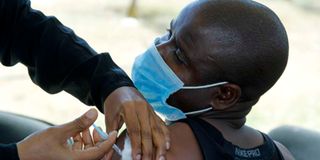With Covid-19 strains, one jab not enough

A traveller gets a Covid-19 jab at the Standard Gauge Railway (SGR) Miritini Station in Mombasa on October 14, 2021.
Despite the announcement made last Friday by the World Health Organization (WHO) about the new Covid-19 variant, Omicron, Kenya seems reluctant to impose travel restrictions into the country even as the number of people testing positive for the mutated coronavirus surges in South Africa.
WHO has classified Omicron, which was detected by South Africa, as a variant of concern, implying that it could be more contagious, cause severer disease and even reduce the efficacy of vaccines and treatment currently on offer.
It’s said to be having some concerning properties with a large number of mutations, which are said to be worrying characteristics. However, epidemiological studies are underway to understand if it is because of Omicron or other factors. Preliminary evidence also suggests an increased risk of reinfection for this variant as compared to others that we have had before.
The journey has not been easy—not only for Kenya, but for the whole world—with Covid-19 since the first case was reported last year, yet challenges remain.
In a bid to contain the virus, the government recently introduced a mandatory rule on everyone getting their Covid-19 vaccine doses. But you realise that this will not be enough, considering that other countries have already started imposing travel restrictions due to the new “variant of concern”.
Economic depression
Moreover, we can also agree that we Kenyans are victims of negligence. Just because of the one flight from China, we are still under economic depression, though on our way to recovery, with a lot of debt in our name.
Inasmuch as the larger percentage of our revenue is from the agriculture and tourism sectors, Kenya ought to take responsibility and at least copy what other countries are doing until a solution is found.
Saying that we’re heading to a peak season with holidays and forcing everyone in the country to be vaccinated is not an excuse for us to be exposed to Omicron, yet we barely survived the last wave of Covid-19.
As a way of keeping Kenyans safe, the government should consider adopting actions such as enhancing surveillance and sequencing of cases by sharing it on publicly available databases, just as they have been doing.
Secondly, let it implement public health measures to reduce Covid-19 circulation by using a risk analysis- and science-based approach. Thirdly, boost public health and medical capabilities to manage an increase in cases.
Fourth, ensure inequities to access Covid-19 vaccines are urgently addressed to ensure that vulnerable groups everywhere, including health workers and older persons, receive their complete doses, alongside access to treatment and diagnostics so as to protect ourselves, our loved ones and other people around us.
Cynthia Ochieng', Nairobi




